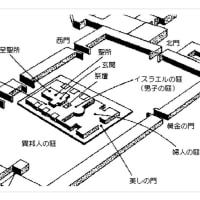20章 主の安息を守り回復する
1.安息日を汚す
1節、「第七年の第五の月の十日」は、BC591年の7-8月の頃と思われます。何人かの長老たちがエゼキエルのもとにやってきました。彼らは、これからのことについて神のみこころを聞きたいと考えていました。そこでエゼキエルは、神のことばを伝えます。それは、イスラエルの背教の歴史を振り返るものです(5-32節)。出エジプト(5-9節)、荒野(10-26節)、カナン入植(27-29節)、エゼキエルの時代(30-32節)に至るまで、イスラエルはずっと偶像礼拝と神への反逆を繰り返してきた、と。
この反逆で注目させられるのは、「安息日を汚した」という繰り返しです(13、16、21節)。神は言います「わたしはまた、彼らにわたしの安息日を与えて、わたしと彼らとの間のしるしとし」た、「安息日を聖なるものとせよ」と。しかし実際のところ彼らは、モーセを通して伝えられた神のことばをしっかり受け止めず、エジプトにいた生活習慣のままに安息日にもマナを集めようとして、罰せられています(出エジプト記16章)。安息を安息として守ることは、神を信頼する民としてのしるし、証であったのです。彼らはその新しい生活習慣が、諸民族に対するしるしとなるまで、40年の荒野の訓練を受けた、と言うべきでしょう。
そのような意味で言えば、今日のキリスト者にとっても、安息が、キリスト者以外の人々へのしるしとなっているかどうか。日曜日になれば、聖書と讃美歌を手に、教会へいそいそ出かける、彼らは礼拝する民なのだ、とどれほど認められているのか。牧会30年以上の歴史の中で、私は礼拝に対する信仰者の様々な姿勢を見てきました。今日は忙しいのでスキップ、あるいはオンラインで参加します、という人々もおります。そのような人々が、友人や家族へ思うように福音が伝えられないと言っても、それはしょうがないことだなと思うことがあります。家族からすれば、信仰を第一とせず、二の次にしている、そんなものに関心を持てと言われても無理な相談です。
繰り返しの言葉に注意したいのです。11、13、21節「人は、それらを行うなら、それらによって生きる。神のことばに注目すべきです。神が命じられたとおりに、安息日を安息として守る。そこに生きていく、それによって周囲の人々は、この人は神を礼拝する民であり、神の正しさに生きることを大事にしていると、認めるわけです。それがそれなりの尊重を得る、これが宣教なのだと私は思います。
2.わたしの名のために
イスラエルの歴史は、周囲の人々には、まことの神を信じているしるしにはならなかった、と言います。カナン入植時代、彼らは異教のカナン人の宗教、習わしに従い、神の民としての独自性を失っていました。つまり出エジプト後起こった新しい世代も、モーセの言うことに聞かず、安息日に取りに行ってはならないというマナを、安息日に捜しに行く世代の人々を超えられなかったのです。いやむしろ彼らは積極的にその土地の習俗に倣ってしまいました(27-29節)。そしてさらに、エゼキエルの時代の人々も、先祖の歩みを超えることはありませんでした(30-32節)。
にもかかわらず、神は、第二の出エジプト、バビロン捕囚からの帰還を予告されるのです(35-36節)。そしてなおも、ご自分を主と認めていくご自分の民を興そうとする熱意を示されるのです(38節)。
注目すべきは、神が裁かれるのは「あなたがたの悪しき生き方や、腐敗した行い」によるのではない、という点です。むしろ「わたしの名のために」というように(44節)この世には正しいことを行われる神がおられる、その存在を示すためなのだ、と言います。つまり、神は、ただ警察のように反則切符を切って罰して終わりではありません。むしろ、それは、教育のため、世の中には正しい神がおられて、正しさが大事にされるためである。だから頑迷に何世代も同じ過ちを繰り返すイスラエルの民に神は、変わらず愛し関わり続けてくださって、イスラエルを育てようとしておられる、と言うわけです。
そうであればこの神の存在を認め、神の安息の祝福に与ることを大事にしたいものです。コロナが終わり、共に集まることが許されている恵みの時が再開しているのです。オンラインの便利さは便利さとして受け止めつつも、礼拝を視聴するようなあり方にはピリオドを打ちたいものです。そして、教会に代わるような交わりに参加することも終わりにしましょう。神が与えてくださった自分の所属教会を愛し大事にして、所属教会へ出かけて、共に主の安息を喜ぶ礼拝の時を持ちましょう。では今日も良き一日となるように祈ります。
<クイズコーナー>
最初に、昨日のクイズです。シロッコ風、あるいは東風とも呼ばれる熱風の最多発期はいつ頃でしょうか?①1月~4月、②5月~10月、③11月から12月。答えは、②5月~10月でした。シロッコ風は、アラビヤ砂漠を渡って、東、南南東、時には南南西から吹いてくる乾燥した熱風で、数時間のうちに、気温が15-20度もがあるとされます。では、今日の聖書クイズです。ネゲブ地方の北端は、どこになるでしょうか?①ガザからベエル・シェバを通り死海に至る線、②エジプト川からエラテに至る線、③キション川からヨルダン川に至る線、答えはまた明日。では今日も良き一日となるように祈ります。
Chapter 20: Keep and Restore the Lord's Sabbath
1. defiling the Sabbath
Verse 1, "the tenth day of the fifth month of the seventh year," is thought to be in July-August of 591 BC. Some elders came to Ezekiel. They wanted to hear God's will about what was to come. So Ezekiel delivers the Word of God. It is a review of the history of Israel's disobedience (vv. 5-32). He says that throughout the Exodus (vv. 5-9), the wilderness (vv. 10-26), the settlement of Canaan (vv. 27-29), and Ezekiel's time (vv. 30-32), Israel has been in idolatry and rebellion against God.
What is remarkable about this rebellion is the repetition of "defiling the Sabbath" (vv. 13, 16, 21). God says, "I have also given them My Sabbaths as a sign between Me and them," and "keep the Sabbath day holy." In reality, however, they were punished for not heeding the Word of God delivered through Moses, and for trying to gather manna on the Sabbath as they had done in Egypt (Exodus 16). Keeping the Sabbath as a Sabbath was a sign and a testimony of a people who trusted in God. It should be said that they underwent 40 years of wilderness training before their new way of life became a sign to the nations.
In that sense, I wonder if the Sabbath is also a sign to non-Christians today. How well are they recognized as a worshipping people who rush to church on Sundays, Bible and hymns in hand? In my 30+ years of pastoral ministry, I have seen many different attitudes of the faithful toward worship. Some people say, "I'm busy today, so I'll skip it or join online. Sometimes I think it's understandable that these people don't share the gospel with their friends and family as much as they would like to. From the family's point of view, they are not putting their faith first, they are putting it second. It is impossible to ask them to be interested in such a faith.
I want to draw attention to the repeated words: vv. 11, 13, 21, "If one does them, he lives by them. We should pay attention to the Word of God. Keep the Sabbath day as a Sabbath, as God has commanded. Live there, and by doing so, the people around you recognize that this is a people who worship God and cherish living in His righteousness. I believe that this is missionary work.
2. for my name's sake
Israel's history, they say, was not a sign to those around them that they believed in the true God. During the time of Canaanite settlement, they followed the religion and practices of the pagan Canaanites and lost their uniqueness as God's people. So the new generation that came after the Exodus did not go beyond the generation that did not listen to Moses and go looking for the manna on the Sabbath, which they were not allowed to do on the Sabbath. Rather, they actively followed the local customs (vv. 27-29). And furthermore, the people of Ezekiel's time did not go beyond the steps of their ancestors (vv. 30-32).
Nevertheless, God foretells a second exodus, the return from the Babylonian captivity (vv. 35-36). And yet, He still shows His zeal to raise up His own people who will recognize Him as Lord (v. 38).
It is important to note that God will not judge "your evil lives or your corrupt deeds. Rather, he says, "for my name's sake" (v. 44), to show that there is a God who does what is right in the world. In other words, God is not just like the police, punishing people with a foul ticket and that is the end of it. Rather, it is for the sake of education, for there is a righteous God in the world, and righteousness is valued. That is why we say that God continues to love and relate to the Israelites who stubbornly repeat the same mistakes generation after generation, and that He is trying to raise them up.
In this case, we should acknowledge God's presence and cherish the blessing of God's rest. The corona is over and the time of grace in which we are allowed to gather together has resumed. While we accept the convenience of online as a convenience, we want to put a period on the way we view worship. And let us end our participation in fellowship that replaces church. Let us love and cherish the church that God has given us, and let us go to our churches and have a time of worship where we rejoice in the Lord's rest together. I pray that you will have a good day today.
<Quiz Corner
First, yesterday's quiz. When is the most frequent season for hot winds, also called sirocco winds or easterly winds? (1) January to April, (2) May to October, and (3) November to December. The answer was (2) May to October. Sirocco winds are dry, hot winds that blow from the east, south-southeast, and sometimes south-southwest across the Arabian Desert, with temperatures as high as 15-20 degrees in a matter of hours. Now for today's Bible quiz. Where is the northern tip of the Negev region? (1) The line from Gaza through Beersheba to the Dead Sea, (2) the line from the Egyptian river to Elate, (3) the line from the Kishon River to the Jordan River, and the answer will be given tomorrow. Well, I wish you a good day today.
















